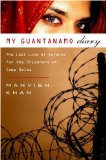Summary | Excerpt | Reviews | Beyond the Book | Readalikes | Genres & Themes | Author Bio

Critics' Opinion:
Readers' Opinion:
First Published:
Jun 2008, 320 pages
Paperback:
Jun 2009, 320 pages
 Book Reviewed by:
Book Reviewed by:
Lesley Marshall
Buy This Book
Excerpt
My Guantanamo Diary
The prisoner was standing at the far end of the room behind a long table. His leg was chained to the floor beside a seven-by-eight-foot cage. He looked wary as the door opened, but as our eyes met and he saw me in my traditional embroidered shawl, a smile broke across his weathered features. I smiled back and gave him the universal Islamic greeting:
“As-salaam alaikum—May peace be upon you.”
“Walaikum as-salaam—May peace also be upon you,” he responded.
With that, I shook hands with my first “terrorist.”
He was a handsome, soft-spoken man with a short, neatly groomed beard. His once-dark hair was heavily flecked with gray. He was dressed in an oversized white prison uniform. I thought he looked much older than his forty-six years—closer to sixty or seventy.
...
His name was Ali Shah Mousovi. He was a pediatrician and the son of a prominent Afghan family from the city of Gardez, where he’d been arrested by U.S. troops more than three years earlier. He had returned to Afghanistan in August 2003 after twelve years of exile in Iran, he told us, to help rebuild his wathan, his homeland.
...
Our courts recognize the difficulty of filing a habeas corpus petition from jail. Many detainees did not speak English or understand our laws. In such cases, the courts will allow a “next-friend petition,” in which a father, brother, mother, or friend may act as an agent for the prisoner. That’s how many Guantánamo detainees got lawyers.
Laws don’t get much more fundamental than habeas corpus. It’s an old safeguard preventing imprisonment without charge and a right embedded in the U.S. Constitution. “Habeas corpus” is a Latin phrase meaning “You have the body.” Bringing a habeas petition forces the captor to provide justification for holding his captive.
There was a ceiling camera in the cage to the right of our table, into which Mousovi was put before and after our meetings and at lunchtime. We’d been told that the camera was there for our protection. I wondered what could happen to us in a room with a prisoner who was shackled to the floor.
Attorney-client meetings at Guantánamo are supposed to be privileged and confidential, and the base captain had told us that morning that because the camera was located inside the cage, it couldn’t pick up images of the legal papers laid on the table. He also told us that the camera wasn’t recording us and didn’t have audio, so we shouldn’t worry about the military listening in on our conversations. I wondered about that.
...
As I translated from Pashto, Mousovi hesitantly described his life since his arrest. He had gone back to Gardez in August 2003 and remembered the small crowd of well-wishers who came out to greet his car as it jostled down the rocky mountain road into town. Sixty or eighty people, maybe more, rushed to meet him. They threw their arms around him, grateful for the return of professionals to Afghanistan.
In the coming days, he, his brother Ismail, and his cousin Reza, who were also physicians, planned to open their clinic. Once it was up and running, the men would fetch their families from Iran. Instead, on his second night in Gardez, American soldiers broke down the door to Mousovi’s family guesthouse and took him away. He was accused of associating with the Taliban and of funneling money to anticoalition insurgents.
After his arrest, he spent twenty-two days in a makeshift outdoor jail in Gardez under constant interrogation and without the opportunity to shower or bathe. Then, he had been transported by helicopter to Bagram Air Force Base in Afghanistan. There, he was thrown into a tiny three-and-a-half-by-seven-foot shed—face down, blindfolded, hooded, and gagged. Lying like this, he said, he was kicked in the head repeatedly.
From the book My Guantánamo Diary by Mahvish Khan. Reprinted by arrangement with PublicAffairs (www.publicaffairsbooks.com), a member of the Perseus Books Group. Copyright © 2008.





The Funeral Cryer by Wenyan Lu
Debut novelist Wenyan Lu brings us this witty yet profound story about one woman's midlife reawakening in contemporary rural China.
Your guide toexceptional books
BookBrowse seeks out and recommends the best in contemporary fiction and nonfiction—books that not only engage and entertain but also deepen our understanding of ourselves and the world around us.